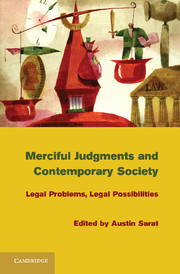Book contents
- Frontmatter
- Contents
- Acknowledgments
- Contributors
- When Can or Should Legal Judgment Be Merciful? An Introduction
- 1 The Place of Mercy in Legal Discourse
- Commentary on Chapter 1
- 2 Mercy, Crime Control, and Moral Credibility
- Commentary on Chapter 2
- 3 Defending a Role for Mercy in a Criminal Justice System
- Commentary on Chapter 3
- 4 Actions of Mercy
- Commentary on Chapter 4
- 5 A Feminist View of Mercy, Judgment, and the “Exception” in the Context of Transitional Justice
- Commentary on Chapter 5
- Index
- References
2 - Mercy, Crime Control, and Moral Credibility
Published online by Cambridge University Press: 05 December 2011
- Frontmatter
- Contents
- Acknowledgments
- Contributors
- When Can or Should Legal Judgment Be Merciful? An Introduction
- 1 The Place of Mercy in Legal Discourse
- Commentary on Chapter 1
- 2 Mercy, Crime Control, and Moral Credibility
- Commentary on Chapter 2
- 3 Defending a Role for Mercy in a Criminal Justice System
- Commentary on Chapter 3
- 4 Actions of Mercy
- Commentary on Chapter 4
- 5 A Feminist View of Mercy, Judgment, and the “Exception” in the Context of Transitional Justice
- Commentary on Chapter 5
- Index
- References
Summary
Should mercy have a role in the operation of the criminal justice system? That is the question this chapter will examine. As a preliminary matter, however, consider what mercy does and does not mean.
What Does Mercy Mean?
The standard definition of mercy – “kindness in excess of what may be expected or demanded by fairness” – makes clear that much of what sometimes passes for “mercy” in the criminal law context is no such thing. When a very light sentence is given to a young first-time offender, it is not an exercise of mercy. If a criminal justice system purports to be in the business of doing justice, then normal principles for assessing blameworthiness would take account of the youthfulness and inexperience of the offender. On a conclusion of significantly reduced blameworthiness, moral desert would demand a significantly reduced sentence. Such is not an exercise of mercy but simply careful application of principles of desert. Many writers have confused true and careful justice with mercy, but others have pointed out the confusion. It is an important distinction to get right in part because an offender has a right to justice, but classically mercy is a matter of grace.
- Type
- Chapter
- Information
- Merciful Judgments and Contemporary SocietyLegal Problems, Legal Possibilities, pp. 99 - 123Publisher: Cambridge University PressPrint publication year: 2011
References
- 1
- Cited by



